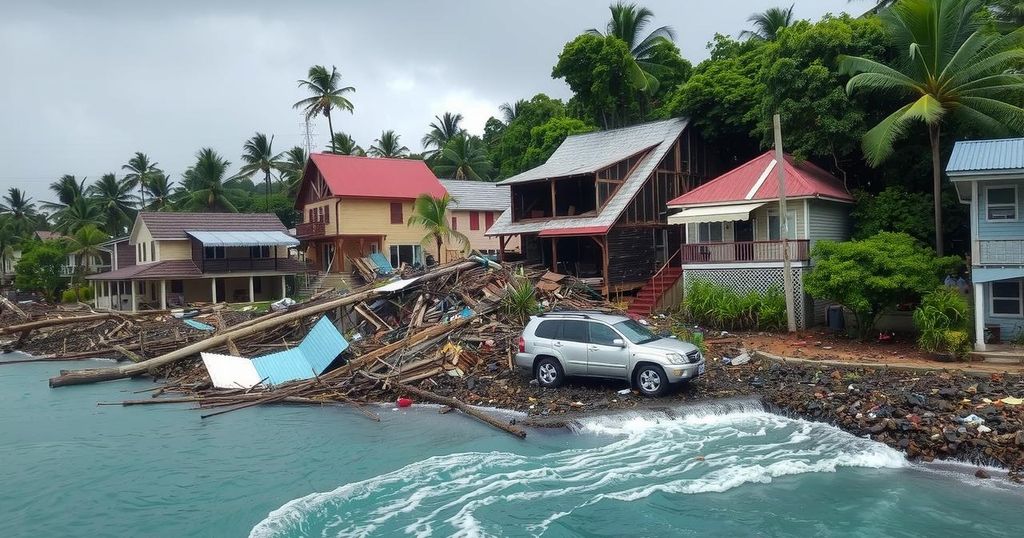Catastrophic Aftermath of Cyclone Chido in Mayotte: A Community in Crisis

Cyclone Chido devastated Mayotte on December 15, 2024, causing widespread destruction and loss of life, with initial reports indicating at least 14 fatalities and fears that the toll could rise significantly. The hurricane-strength winds and flooding undermined critical infrastructure, rendering rescue efforts challenging. Mayotte, grappling with socioeconomic issues and a high number of undocumented migrants, faces a complex recovery ahead in the wake of this unprecedented natural disaster.
Mayotte, a French territory in the Indian Ocean, has experienced catastrophic damage following the passage of Cyclone Chido, a 100-year storm event classified as a Category 4 cyclone. The cyclone made landfall on December 15, causing destruction comparable to what one might expect from an atomic bomb, as described by local residents. Numerous reports indicate severe implications for the island’s infrastructure, with entire neighborhoods devastated, and the potential death toll is expected to rise significantly beyond the initial reports of at least 14 fatalities.
The cyclone, which produced winds exceeding 220 kilometers per hour (136 miles per hour), ranks as the most powerful storm to have hit the region in over nine decades. Bruno Garcia, a hotel owner in the capital, Mamoudzou, stated, “We lost everything. The entire hotel is completely destroyed.” The inevitable repercussions of such disasters are further compounded by Mayotte’s socioeconomic struggles, including high levels of poverty and unemployment amid a growing migration crisis, which rendered disaster response efforts intricately challenging due to the overwhelming conditions resulting from the cyclone’s aftermath.
The infrastructure and communication networks are significantly impaired, restricting rescue operations and assessments of the damage. Local officials, including Mayotte Prefect François-Xavier Bieuville, express grave concerns over the death toll, indicating it could range from hundreds to potentially thousands of victims. In the words of Mohamed Ishmael, another resident, “Honestly, what we are experiencing is a tragedy… I saw an entire neighborhood disappear.” The extent of the destruction is exacerbated by the vulnerabilities that undocumented migrants face within the territory, as many have found themselves in precarious living conditions that are now nearly eradicated.
The devastation experienced in Mayotte due to Cyclone Chido underscores the increasing frequency and intensity of tropical cyclones, a trend implicated in climate change. Mayotte, located in the Indian Ocean, faces unique challenges due to its socioeconomic profile. With a population exceeding 300,000, it features a large number of undocumented migrants, primarily from Comoros and Madagascar, complicating evacuation and relief efforts following natural disasters. Previous cyclones in the southwestern Indian Ocean have highlighted the region’s vulnerability, with Cyclone Chido serving as a stark reminder of the risks associated with increasing climatic extremes.
The aftermath of Cyclone Chido in Mayotte highlights the urgent need for improved disaster preparedness and response mechanisms, particularly in regions grappling with high poverty levels and infrastructural vulnerabilities. The challenges posed by undocumented immigration further complicate these efforts, emphasizing the importance of inclusive strategies in disaster planning. As the island begins its recovery, the estimated human toll underlines a broader narrative about the increasing destructiveness of storms in the context of global climate change.
Original Source: www.accuweather.com








